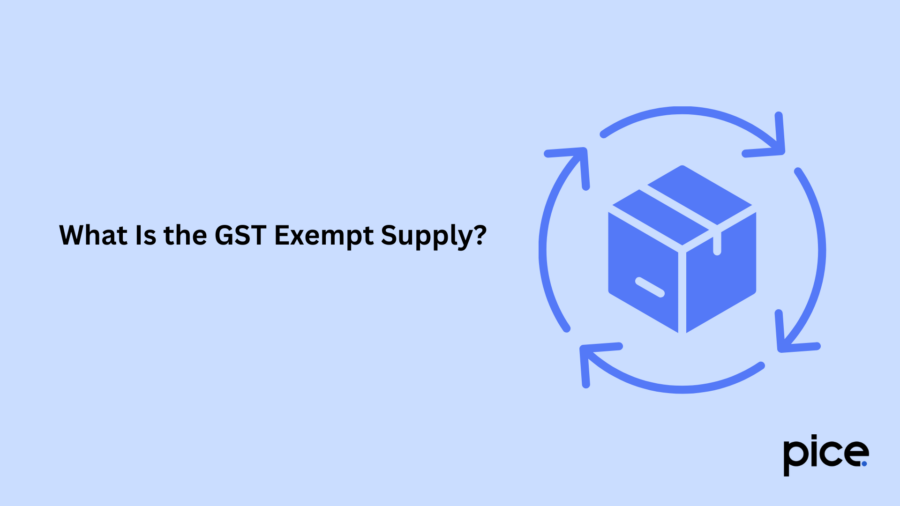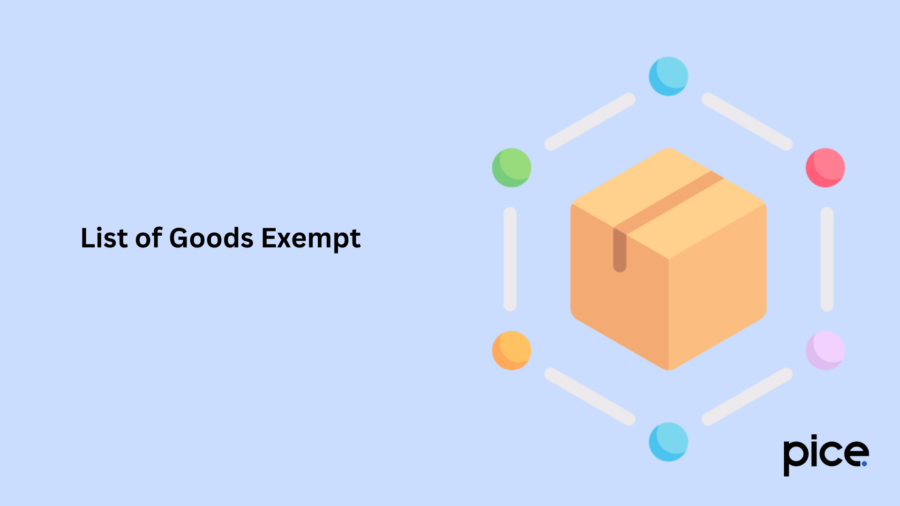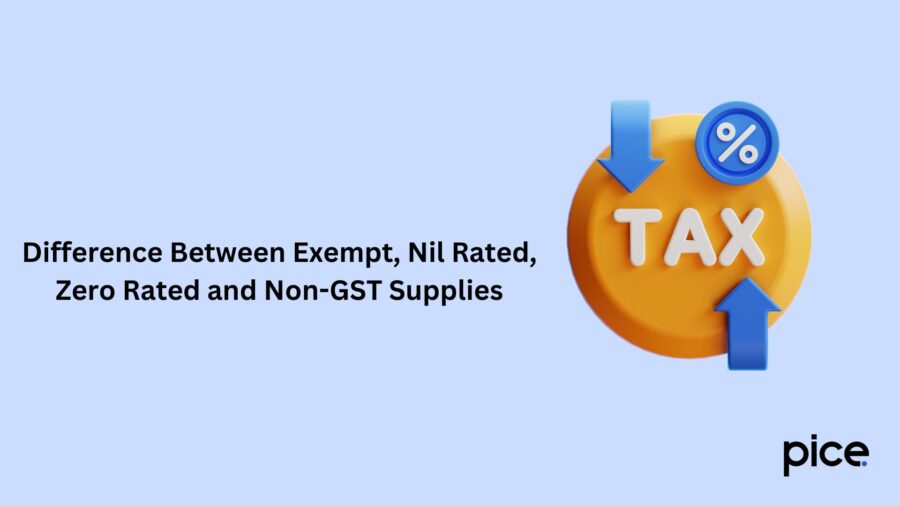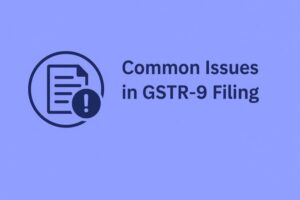GST Exempt Supply: List of Goods Exempted
- 18 Oct 24
- 11 mins

GST Exempt Supply: List of Goods Exempted
Key Takeaways
- Exempt Supply Definition: Goods and services not subject to GST, with no input tax credit available.
- Types of Exemptions: Non-taxable, nil-rated (0% GST), and government-notified exemptions for public interest.
- Common Exempt Items: Fresh fruits, milk, healthcare, and educational services.
- Reasons for Exemption: Social welfare, small business relief, agriculture, and export promotion.
- Exempt vs. Nil vs. Zero-Rated: Exempt supplies avoid GST, nil-rated at 0%, and zero-rated (like exports) allow input tax credit.
Certain goods and services are considered exempt supply under GST. The government allows such exemptions to promote easy business operations and ensure GST compliance for businesses. This blog elaborates on exempt supplies of goods and services to help you make informed decisions.
What Is the GST Exempt Supply?

Goods and services that do not attract GST are GST-exempt supplies. As a result of the exemption, registered taxpayers cannot claim input tax credits on GST-exempt supplies.
Bread, fresh milk and fresh fruits are examples of GST-exempt supply, defined under Section 2(47) of the GST Act. However, zero-rated supplies such as exports of goods and services are not considered exempt supplies.
Exempt supplies can be the following:
- Nil-rated supplies or supplies attracting 0% GST
- Supplies exempt from GST under Section 11 of the CGST Act or Section 6 of the IGST Act
- Non-taxable supplies under Section 2(78) of the Act
The Central or State Governments grant exemptions based on the conditions mentioned below:
- Exemptions in the public interest
- By way of the issue of notifications
- GST Council must recommend the exemption
- Absolute or conditional exemption for specific goods and services
- Exemptions under special order for exceptional circumstance
- The registered person or supplier of goods and services should not be entitled to collect tax higher than the effective rate.
Types of GST Exemptions
Here are the types of GST exemptions:
Non-taxable Supply: Goods and services supplied but not chargeable under GST as per Section 7(2)(b) are non-taxable supplies.
Supply Attracting Nil Rate of Tax: Goods and services are taxable at nil rate or 0%.
Exempted Supplies Under Section 11 Excluding IGST and Section 6 of the IGST Act: Specific goods and services exempted under Section 11 and Section 9 of the GST Act.
In addition, exemption from GST can be classified in the following way:
Absolute Exemption
Exempted supplies without any specific condition are absolute exemptions. For instance, the distribution of electricity by an electricity distribution company is an example of absolute exemption.
Conditional Exemption
Supplies subject to certain conditions are termed conditional exemptions. For instance, healthcare services provided by healthcare units such as critical care units, intensive cardiac care units and neonatal intensive care units with room charges above ₹5,000 per day are examples of conditional exemptions.
Partial Exemption
Intra-state supplies or goods and services by an unregistered person to a registered person are partial exemptions under the reverse charge mechanism. However, the aggregate value of supplies should not be more than ₹5,000 per day.
Classification of Exemptions
Here are the classifications of exemptions:
- Supplier May Be Exempt:
Irrespective of the nature of outward supply, the supplier is exempted from GST. For instance, charitable services are exempt from GST.
- Certain Supplies May Be Exempt:
Certain goods and services are exempt from GST based on the nature and type of goods and services. For instance, sponsorship of events, and services for public conveniences are examples of GST-exempt supplies.
List of Goods Exempt

List of goods exempt from GST can be classified in the following ways:
GST Exemption from Registration
Here is the list of GST exemptions from registration:
- A person under exempted turnover limit for supply of goods ₹40 lakhs and supply of services ₹20 lakhs. In addition, specified categories of turnover of ₹20 lakhs and ₹10 lakhs are exempt from GST.
- Suppliers supplying nil-rated or exempt goods and services such as fresh milk, agricultural services and cheese.
- Persons engaged in GST-exempt supply of goods and services such as funeral services and petroleum products.
- Suppliers supplying goods and services under reverse charge mechanisms such as tobacco leaves and peeled cashew nuts.
The following table illustrates the list of common goods that are exempt under GST:
| Types of Goods | Examples |
| Live animals | Cows, sheep, goats, poultry |
| Meat | Fresh and frozen meat |
| Fish | Fresh or frozen fish |
| Natural products | Honey, fresh and pasteurised milk, cheese, eggs |
| Live trees and plants | Bulbs, roots, flowers, foliage |
| Vegetables | Tomatoes, potatoes, onions |
| Fruits | Bananas, apples, grapes |
| Dry fruits | Walnuts, cashew nuts |
| Tea, coffee and spices | Coffee beans, turmeric, tea leaves, ginger |
| Grains | Wheat, oats, rice, barley |
| Products of the milling industry | Different types of flour |
| Seeds | Oil seeds, flower seeds, cereal, husks |
| Sugar | Jaggery, sugar |
| Water | Tender coconut water, mineral water |
| Baked goods | Bread, pizza base, puffed rice |
| Fossil fuels | Electrical energy |
| Drugs and pharmaceuticals | Contraceptives, human blood |
| Fertilisers | Goods and organic nature |
| Beauty products | Kumkum, kajal, bindi |
| Waste | Sewage sludge, municipal waste |
| Ornaments | Glass and plastic bangles |
| newsprint | Rupee notes, judicial stamp paper, envelopes |
| Printed items | Books, newspapers, maps |
| Fabrics | Silkworm cocoon, khadi, raw silk |
| Hand tools | Spade, hammer |
| Pottery | Clay lamps, earthen pots |
The list below highlights the services exempt under GST:
| Types of services | Examples |
| Agricultural services | Cultivation, supplying farm labour, harvesting, warehouse-related activities, renting or leading agricultural machinery, services provided by a commission agent or the Agricultural Produce Marketing Committee or Board for buying or selling agricultural produce, etc. |
| Government services | Postal service, transportation of people or goods, services by a foreign diplomat in India, services offered by the Reserve Bank of India, services offered to diplomats, etc. |
| Transportation services | Transportation of goods by road, rail, water, etc., payment of toll, transportation of passengers by air, transportation of goods where the cost of transport is less than ₹1,500, etc. |
| Judicial services | Services offered by the arbitral tribunal, partnership firm of advocates or senior advocates to an individual or business entity whose aggregate turnover is up to ₹40 lakh |
| Educational services | Transportation of faculty or students, mid-day meal scheme, examination services, services offered by IIMs, etc. |
| Medical services | Services offered by ambulances, charities, veterinary doctors, medical professionals, etc. do not include hair transplants or cosmetic or plastic surgery. |
| Organisational services | Services offered by exhibition organisers for international business exhibitions, tour operators for foreign tourists, etc. |
| Other services | Services offered by GSTN to the Central or State Government or Union Territories, admission fee payable to theatres, circuses, sports events, etc. which charge a fee up to ₹250 |
Reasons for Exemption Under GST
Here are the reasons for exemption under GST:
- Social Welfare and Public Interest
Essential goods and services used for the welfare of society are exempt under GST. For instance, basic food items including rice, wheat, milk, healthcare services and educational services are exempt under GST.
- Small Businesses
Businesses with lower aggregate annual turnover rates often enjoy exemptions under GST. The government aims to promote ease of business operation and reduce compliance burdens on small businesses by making provisions for exemptions under GST. For instance, small businesses with lower turnover limits under the composition scheme enjoy lower GST rates.
- Export of Goods and Services
Exports from India are zero-rated supplies under GST. This ensures the GST percentage for these supplies is taxed at 0%, facilitating competitiveness in the international markets. Thus, exporters do not face the burden of GST for their transactions.
- Interstate Supplies
Supplies of goods and services between certain Indian states are often exempt under GST. Alternatively, these goods and services may be taxed at a concessional rate to facilitate the free movement of goods and services across state borders.
- Agriculture
The agricultural sector in India is a major contributor to the economy’s growth and Gross Domestic Product (GDP). As a result, the Indian government allows exemptions under GST for certain agricultural products and services.
- Government Services
To simplify accounting and avoid double taxation or the cascading effect of taxation, the government allows exemptions under GST for certain services by the government and local authorities.
- Financial Services
Financial services such as banking and interest on loans are exempt under GST. Additionally, insurance services are often subject to special provisions that determine the GST liability.
- Cultural and Religious Significance
Considering the cultural and social values of society, goods and services supplied for cultural, religious and charitable purposes are often exempt under GST.
- Administrative Simplicity
To make GST compliance easier for businesses, reduce compliance costs and simplify the tax system, the government exempts certain goods and services under the GST system.
- Transitional Provisions
The Indian government allows exemption on certain goods and services for businesses migrating to the new tax regime under GST. This helps these businesses comply with the GST rules while paying lower tax rates.
GST Exemption for Businesses
The 32nd GST Council Meeting revised the limits for GST exemption as follows:
- The aggregate turnover for businesses and individuals supplying goods is ₹40 lakh.
- However, the limit for hilly and northeastern Indian states is ₹20 lakh.
- For individuals and businesses supplying services, the aggregate turnover limit is ₹20 lakh.
Difference Between Exempt, Nil Rated, Zero Rated and Non-GST Supplies
Here are the different types of supplies based on exemptions:

Exempt Supplies
Exempt supplies of goods and services are those in which no GST is charged. Further, suppliers cannot claim input tax credits for the GST that they pay on inputs and services. Examples of exempt supplies include fresh fruits, vegetables, milk and healthcare services that clinical establishments render.
Nil Rated Supplies
Nil-rated supplies are subject to a 0% GST rate wherein the suppliers do not have GST liability. However, suppliers can claim input tax credit for the GST paid on inputs and services purchased. Examples of nil-rated supplies include the export of goods and services like pharmaceuticals and specific agricultural products.
Zero Rated Supplies
Zero-rated supplies have features similar to nil-rated supplies wherein the rate of GST is 0%. Exports to international regions are examples of zero-rated supplies. Suppliers can claim the input tax credit on these supplies for the GST paid on the purchase of goods and services.
Non-GST Supplies
Non-GST supplies are outside the scope of GST. As a result, they are exempted under the GST rules. As these are exempted from GST, no collection of tax is applicable for these goods and services.
In addition, suppliers cannot claim input tax credits on these goods and services. Examples of non-GST supplies include petroleum products, alcohol for human consumption, stamps and currency.
Conclusion
Exempt supply under GST can be nil-rated, zero-rated or excluded from GST scope. These goods and services do not attract GST for the taxpayers. However, based on the type of goods and services, taxpayers can claim the input tax credit on the GST paid on the purchase of inputs and services. This helps taxpayers reduce their output tax liability on outward supplies.
💡If you want to streamline your payment and make GST payments, consider using the PICE App. Explore the PICE App today and take your business to new heights.
 By
By 

















